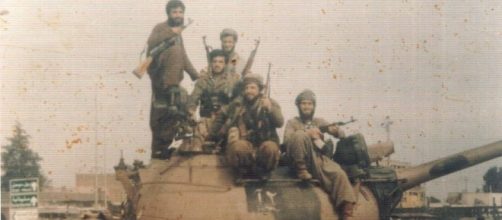U.S. special ops forces are reported to have been deployed in Syria as Kurdish forces press on the attack in Raqqa. According to military sources, the U.S. troops were dropped in Syria to deter any kind of planned Syrian invasion by Turkey. It is also a tactical response by the Americans to the massive buildup of Turkish troops on the Syrian border.
How will a small U.S. spec ops contingent prevent an invasion?
An unknown number of American spec ops forces are deployed in the town of Tal Abyad, a city that is held by the Kurdish troops (YPG). The town fell under Kurd control way back in 2015, in the height of the Syrian civil war and the surge of ISIS fighters carving a "caliphate" in Eastern Syria and Northern Iraq.
This city had been under attack from Turkish warplanes targeting Kurdish rebels and Iraqi Peshmerga forces. Turkey is not happy that the United States is supporting and funding the Kurds, which they label as rebels and terrorists. The Turkish government is uncomfortable knowing Kurdish troops are being significantly armed by the Pentagon. However, the U.S. promised Ankara that after the destruction of ISIS, the arms will be returned and taken back to America.
U.S. forces tour the SDF-held town of Tal Abyad. pic.twitter.com/A1WKdzr6pE
— Afarin Mamosta (@AfarinMamosta) June 27, 2017
The U.S. forces are intended to provide a diplomatic shield against Turkish military strikes. This is after intelligence points out a Turkish military plan of crossing the Syrian border and attacking Kurdish installations and capturing Tal Abyad.
This is deemed unacceptable to America's military plan, especially as the taking of Raqqa is on its final phase.
How will Assad and Russia react to increasing U.S. troops in Syria?
The Syrian government is plowing through the Eastern Syrian desert and have taken The Deir Ezzor region, which divides the U.S. coalition into two. However, Assad's forces are being threatened by targeted attacks coming from the U.S. forces in Al-Tanf. Despite this, Assad's Syria remains adamant, due to Russia's major contribution to the strength of the Syrian government.
Russia, on the other hand, is working full time to prevent the U.S. to have a free hand over Syria. The total military support coming from Moscow is a major hindrance for the U.S.
led coalition to rid ISIS strongholds inside the country. Because of this, the war against the Islamic State stalls as factions in Syria along with the U.S. and Russia squabble over the political and military overlap.
The war in the Syria had become a testament to the dangers of deliberate foreign intervention on internal problems of a sovereign state, a sin that is perpetuated by the U.S. and Russia as well.


